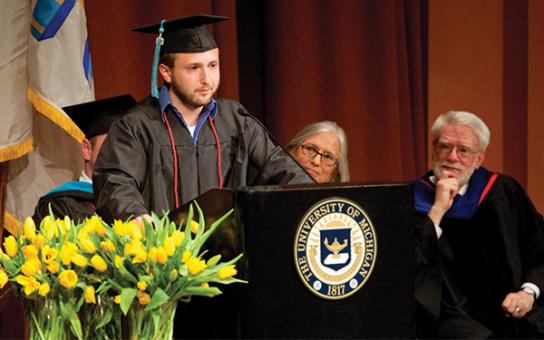Curriculum
Degree requirements
- PUBPOL 320: Politics, Political Institutions, and Public Policy (4 credits)
- PUBPOL 330: Microeconomics for Public Policy (4 credits)
- STATS 250 or SOC 210: Introduction to Statistics (4 credits)
- PUBPOL 474: Values and Ethics (3 credits)
- PUBPOL 476: Applied Learning Seminar (1 credit completed junior year)
- PUBPOL 479: Evaluating Public Policies course (4 credits completed senior year; Stats 250/Soc 210 is a prerequisite so students should complete the course prior to their senior year.)
- PUBPOL 495: Policy Seminar (completed junior year, 4 credits)
- PUBPOL 495: Policy seminar (completed senior year, 4 credits)
- At least 6 additional elective credits in PubPol 300-level or higher course
- 12 additional credits in student-declared focus area
- The Ford School's policy on the assignment of credit hours for undergraduates follows the Provost's guidance on defining the academic credit hour.
Focus areas
The field of public policy touches many academic disciplines and a broad range of policy arenas. Students design focus areas that allow them to develop a deeper understanding of a policy area that interests them.
Focus areas can address an area of public policy, a perspective on public policy, or the policy issues concerning a specific geographic region. Students will take four upper–level classes (12 credits) from any school or college at U-M or during a study abroad/study away program.
Examples of past student focus areas include: Energy Policy, Health Care Policy & Infectious Disease Control/Prevention, Economic Perspectives on Public Policy, Historical Perspectives on Foreign Policy, Development Policy in Southeast Asia, and Middle Eastern Policy.
Policy seminars
Policy seminars (PubPol 495) are small, interdisciplinary courses that emphasize teamwork, writing, analysis, and/or oral presentation. Students take one policy seminar each their junior and senior years.
Recent policy seminar topics include:
- Crime & Public Policy
- Global Financial Markets, Crises, and Policies
- Poverty, Inequality, and Public Policy
- Behavioral Economics
- Drugs, Crime, and Terrorism
- Immigration Policy
- Dangerous Peacemaking
- Energy and Climate
- Philanthropic Foundations
How will you make a difference?

Several years after graduation, our BA alumni include:
- The chief of staff for a member of Congress
- Research directors and program managers for think-tanks, consulting firms, and nonprofit organizations
- Entrepreneurs
- Teachers in large public school districts
- Analysts with city or state human service agencies
- Associate attorneys at law firms in Chicago, New York, and San Francisco
- Lawyers with the U.S. Department of Justice or major advocacy organizations
Learn more about the careers of impact forged by our BAs in public policy.
Download our BA brochure
More information
For prospective students, please use this calendar to schedule appointments.

